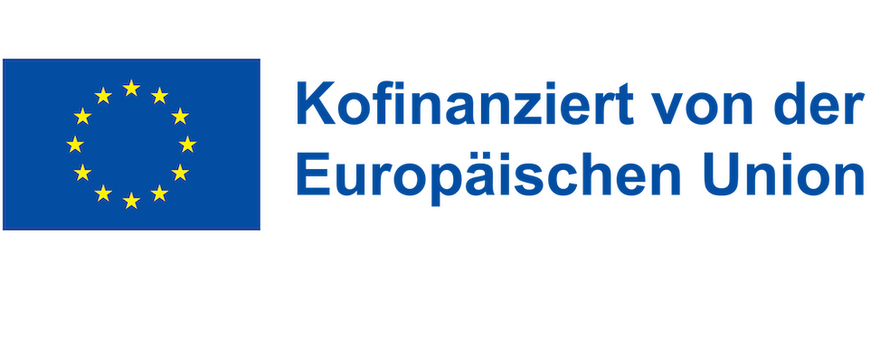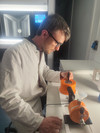
Multigrid holder for cryo-electron microscopy
Applicant: University of Potsdam, Prof. Petra Wendler, Biochemistry
Application number: 86000260-1
Multigrid holder for cryo-electron microscopy
Objective of the acquisition
The multigrid autoloader holder was acquired for the recently installed cryo-FEG transmission electron microscope (cryo TEM). The cryo-TEM is used to examine chemical polymer samples and biological protein complexes at near atomic resolution. The cryo-TEM facility at the University of Potsdam is the only large-scale device for such biological and chemical samples in Brandenburg. It was purchased with funds from the state of Brandenburg and the DFG for a total of 1.1 million euros. The technique is time-consuming and difficult to learn, but is the most important method today for elucidating the structure of proteins or chemical polymer samples. As understanding the structure of a biotechnologically or medically relevant enzyme complex usually goes hand in hand with understanding its function, the cryo-TEM facility plays a central role in the production of innovative medical products or biotechnologically usable biocatalysts. This strengthens the overall profile of the University of Potsdam as a research-oriented university with international visibility. More efficient use of the facility will enable further research collaborations to be introduced as part of existing and planned projects. This will specifically strengthen research alliances in the region and throughout Germany.
The requested multigrid cryo-EM holder enables the viewing of EM grids already prepared for high-resolution microscopes. These grids are equipped with clip rings and do not fit into the conventional holders on site. The ability to view clipped grids makes the entire data collection process more efficient. Furthermore, such a holder enables the use of international cryo-EM facilities for high-resolution data collection, which only accept pre-selected, clipped grids (e.g. IBS Grenoble). This enables seamless collaboration between the TEM facility at the University of Potsdam and international TEM centers such as those at Masaryk University in Brno (Ceitec), Czech Republic, Leiden University (NeCen), Netherlands or the IBS in Grenoble (France). Data collections at these international institutions are also funded by the EU via the European iNExt Discovery program.
Research projects linked to the acquisition:
Regional University of Potsdam
DFG project no. 445804074 Collaboration between Prof. Petra Wendler (Institute of Biochemistry and Biology) and Dr. Matthias Hartlieb (Institute of Chemistry)
Cluster of Excellence (HU Berlin, University of Potsdam) Optobio potentially from 2026; collaboration between Prof. Petra Wendler (Institute of Biochemistry and Biology) Prof. Claudia Matthäus (Institute of Nutritional Sciences)
Regional Berlin/Brandenburg:
Cluster of Excellence (TU Berlin, HU Berlin, FU Berlin, University of Potsdam) Unisyscat until 2025
Cluster of Excellence (HU Berlin, University of Potsdam) Optobio potentially from 2026
DFG project no. 414977640 Collaboration Prof. Petra Wendler with Dr. Ulrich Glebe (Fraunhofer IAP)
DFG project no. 471323994 Collaboration Prof. Petra Wendler with Dr. Martin Reifarth (Fraunhofer IAP)
Collaboration between Prof. Petra Wendler and Prof. Ralf Stohwasser, BTU Cottbus-Semftenberg
Germany-wide:
DFG WE4628/4-1 Collaboration Prof. Petra Wendler with Prof. Jürgen Dohmen, University of Cologne (until 2024; potentially with extension)
BMBF CarboBioElec Collaboration Prof. Petra Wendler with Prof. Anna Fischer and Prof. Matthias Boll (both University of Freiburg)
Collaboration between Prof. Petra Wendler and Dr. Dawaadschargal Dubiel, Otto-von-Guericke University Magdeburg
Europe-wide:
DFG KA 5640/3-1 Collaboration Dr. Max Kahle with the working group of Prof. Pia Ädelroth, Stockholm University
In research and the promotion of young researchers, the project specifically supports the projects of the following young researchers:
Dr. Max Kahle, who was dependent on working with the cryo TEM system with his self-acquired Walter Benjamin position
Dr. Matthias Hartlieb, who is setting up his own research group with an Emmy Noether position (HA_7725_2_1) at the Institute of Chemistry at the University of Potsdam
Dr. Ulrich Glebe, whose Heisenberg professorship based at the University of Potsdam uses cryo TEM
Junior Prof. Claudia Matthäus, who is setting up her own working group at the Institute of Nutritional Sciences at the University of Potsdam as part of the tenure track program
The cryo TEM system, including the requested holder, will be used in the teaching of the Master's degree course “Biochemistry and Molecular Biology” at the Institute of Biochemistry and Biology in the module “Cryo electron microscopy in structural biology”. The project therefore also promotes the training of future generations of scientists in state-of-the-art technologies. This will provide them with key skills and bring them up to date with the latest international research.

